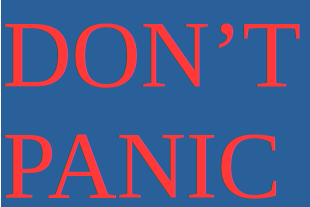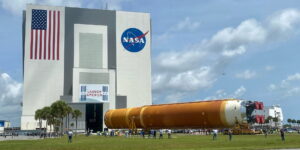British Sci-Fi Books You Simply Must Read
30th Nov 2022
Britain has been the home of some of the greatest authors ever. While people may think of the likes of Dickens and Shakespeare when they consider British authors, the country has also been the origin of some of the most influential science fiction authors. If you’re looking for escapism in book form, what could be better than a distant galaxy or heading into orbit? Below, we explore some of the best British sci-fi books out there.
2001: A Space Odyssey – Arthur C. Clarke
When people hear 2001: A Space Odyssey mentioned in conversation, they may instantly think of the iconic Kubrick film, but the Arthur C. Clarke book is also thoroughly enjoyable.
To say that the film was based on the book isn’t strictly accurate, the two were actually developed concurrently.
After mysterious monoliths are discovered on Earth and on the surface of the Moon, a spacecraft ventures to Jupiter to discover its origins, and who, or what, has been interfering with humankind.
The story covers themes of technology and artificial intelligence, which have become even more pertinent now, over 50 years on from the original release. 2010: Odyssey Two, the sequel, was released in the early 1980s, and followed by 2061: Odyssey Three, and 3001: The Final Odyssey.
Sir Arthur C. Clarke was a fascinating individual with a lifelong interest in space. He served as the chairman of the British Interplanetary Society from 1946 to 1947 and 1951–1953, and also wrote non-fiction about space travel including Interplanetary Flight, a book explaining the very basics of space flight designed to be accessible to all.
The Culture Series – Iain M. Banks
Scottish author Iain Banks wrote in numerous genres, and many of his most popular books were not in the science fiction genre at all.
The “Iain M. Banks” moniker was reserved for his sci-fi writing and The Culture series is one of the most inventive and interesting space opera stories of its time.
As with so many science fiction masterpieces, what The Culture series does so well is reflect human nature back to us through the medium of other races and cultures across space. These books focus on “The Culture” which is a society of hyperintelligent humanoid aliens who live in manufactured habitats throughout our galaxy.
During their travels they tend to come across more primitive civilizations, all the time trying to “civilise” other societies throughout the universe. Themes of the books include post-scarcity, where resources are abundant and virtually free to all.
Enjoyably, each of the books of the series works well as a standalone and you can pick it up at many different points. The books were published between 1987 and 2012, but they are not set in chronological order and flash back and forth through time.
The Hitchhiker’s Guide to the Galaxy Series – Douglas Adams
Britain’s influence on comedy and science fiction cannot be overstated, and in the Hitchhiker’s Guide to the Galaxy, both disciplines are combined. British humour meets British imagination in some of the greatest-ever British sci-fi books.
The books completed by Douglas Adams before his death include The Hitchhiker’s Guide to the Galaxy, The Restaurant at the End of the Universe, Life, the Universe and Everything, So Long, and Thanks for All the Fish, and Mostly Harmless. There were also short stories within the franchise.
Interestingly, The Hitchhiker’s Guide books actually started as a radio series, and have also led to a television show and a feature film starring Martin Freeman.
The premise of the books is a universe where aliens make contact with the Earth and plan to build an intergalactic highway, or “hyperspatial express route” which will destroy the earth. The only man to survive this is the unadventurous Arthur Dent, who gets away on a Vogon spaceship with his friend Ford Prefect, who happens to be from a planet near Betelgeuse (interestingly, a real star, and the second brightest in the constellation Orion).
The franchise has a wonderful dry sense of humour and has some surrealism woven throughout. Few comedy books set in space have achieved this sort of fandom and gained so much interest. It isn’t an easy thing to achieve, but Douglas Adams was a master of his craft.
Charlie and the Great Glass Elevator – Roald Dahl
Charlie and the Chocolate Factory is a book that a huge number of people have heard of, and the film adaptations have also been watched all over the world.
Many who have seen these movies or even read the book don’t realise, is that it has a slightly absurd sequel, Charlie and the Great Glass Elevator, which is actually set in space. It sits comfortably among the quintessential British sci-fi books, but somehow manages to fly under the radar as well.
The story actually carries on from the end of Charlie and the Chocolate Factory. When Willy Wonka has handed over the factory to Charlie, the elevator within ends up getting flung into orbit, Wonka still onboard.
They finally land at the Space Hotel USA, where their docking is misinterpreted as space piracy. The president of the United States even accuses them of being enemy agents.
On top of that, the hotel where they have landed has been invaded by “The Vermicious Knids” which are an alien species of monsters. As you would expect, the adventures of this second book are quite different from those in Charlie and the Chocolate Factory.
There are certainly elements of humour in Dahl’s writing, which is no surprise to anyone who has read his other works. While it may seem farfetched to set the sequel in space, it works. Well, if we can believe that a girl can be turned into a blueberry, the species of aliens is not too much of a stretch.
Revelation Space – Alastair Reynolds
Alastair Reynolds is a former research astronomer with the European Space Agency and an author who has created some epic and impressive British sci-fi books in the genre of hard sci-fi in particular, including four books in the Revolution Space saga.
The book begins in the 2500s, with three different narratives which gradually weave together throughout the novel. This is something Reynolds does expertly in his writing.
The story follows Dan Sylveste who is excavating the remains of the now extinct Amarantin race, but he learns that they had developed advanced technology on their planet around one million years ago.
Meanwhile, another character Ilia Voyova is aboard the Nostalgia for Infinity ship. They are trying to find Sylveste, as they believe he can help them with their battle against a new nanotechnology virus plaguing their crew.
Finally, in the third interwoven tale, Ana Khouri, an assassin, is hired to kill Sylveste. Khouri eventually infiltrates the Nostalgia for Infinity, knowing they are on their way to find Sylveste. The rulers of the planet he is investigating hand him over, with no real way to defend themselves from a feared onslaught.
Once on the ship, Sylveste informs the crew that he has bombs implanted in his eyes, and could destroy them all. He agrees to attempt to tackle the plague that is killing the ship’s captain if they travel to the Cerberus, a planet that holds secrets about the ancient Amarantin civilization. They discover that the planet serves as a beacon and a sentience of star-faring cultures, and realise it to be the cause of the end of all Amarantin civilization.
The Revolution Space saga has three further books. The stories are dense and delve into hard sci-fi, but they are certainly entertaining, and perfect for those looking for true immersion and intergalactic thrill. Reynolds has written other standalone space novels, as well as being commissioned to write one of the spinoff Doctor Who books.
The Outward Urge – John Wyndham
John Wyndham is a science fiction legend who was based in the UK. His best-known books include The Day of the Triffids and The Midwich Cuckoos, and he is one of many sci-fi writers whose work has been turned into television and films.
Not a great deal of his work was actually set in space, but The Outward Urge is one of the books that ventures away from Earth.
Set in the future, the book is split into different parts of a story with 50-year breaks in the story. It features space stations, moon bases, and both Mars and Venus landings.
The story follows one family, the Troons. Their family plays a key role in exploring space due to their “outward urge” to explore.
In 1994, the book follows “Ticker” Troon after a missile attack on a space station owned by the Brits. In 2044, the story takes on a nuclear fallout after the “Great Northern War”. Eventually, expeditions start to colonise the northern parts of the world where nuclear warfare had previously ravaged the Earth.
The explorers finally head into space, and the story follows the political relationship the space-faring civilizations have with the world’s new superpowers, Brazil and Australia.
The work hasn’t been remembered as one of Wyndham’s best, but it features a fascinating take on the near future, and geopolitical commentary within its space adventures. Wyndham himself is undeniably a key player in science fiction, and though he passed away over 50 years ago, his work is still widely revered today.
Moonrise: The Golden Age of Lunar Adventures – British Library Science Fiction Classics
In the golden age when travel to the Moon seemed like a distant dream, authors loved to speculate about what might happen if we ever made it there. From late in the 19th century through to when humankind finally set foot on the moon, there were some incredible works of speculative fiction.
Moonrise: The Golden Age of Lunar Adventures is a collection of 12 different short stories by some huge names in science fiction, and some hidden gems alike. Many of these stories were published in magazines such as The Strand Magazine, and have been hard to find in print historically.
The book is a wonderful, thought-provoking collection that includes stories by British writers including Arthur C. Clarke and John Wyndham.
Notable Mentions among British sci-fi books
A sign of the modern age we live in. Many of the science fiction books that have been set in space and written by British authors happen to be spin-off books, based on huge television and film franchises.
British sci-fi books have been placed in various intergalactic settings in franchises such as Star Wars, Warhammer, Alien, and of course, Doctor Who.
Beautiful Chaos is a well-reviewed novel in the Doctor Who universe, and was written by British author Gary Russell. Cavan Scott contributes books to the Star Wars universe, and Wales-based writer Tim Lebbon wrote novels within the Alien franchise( Out of the Shadows) and the Star Wars Legends series, (Star Wars: Dawn of the Jedi – Into the Void).
From space opera to hard sci-fi, British authors have written plenty of thrilling novels and short stories set in space. This list is not totally exhaustive, there are plenty of other options out there including impressive self-published authors, but this guide features many of the “must-read” British sci-fi books over the last hundred years or so.






Thank you for your comment! It will be visible on the site after moderation.